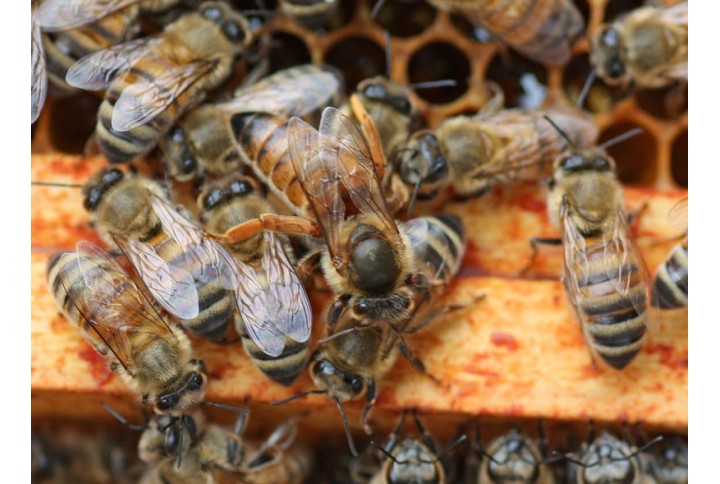New beekeeper tips

Conditions for becoming a beekeeper
1. Absence of sensitivity (allergy) to bee stings
By the designation sensitive to the sting of the bee I mean the person who in addition to inflammation and swelling at the site of the sting also shows general symptoms, such as severe swelling in the area, swelling in the cervical country and other parts of the body shortness of breath, dizziness, weakness, tendency to faint.
There are no protective means that can protect the beekeeper with absolute success. Full-body protective overalls are safe, but not completely.
For this reason people with sensitivity to embroidery should not deal with the bee in any way.
2.Cooperation with an experienced beekeeper.
The first step after the decision to become a beekeeper is to get to know and create a friendly relationship with an experienced beekeeper. His help in familiarity with the masons and the supply of the first bees is absolutely necessary. But then working with him is quite beneficial for the amateur. In addition to personal assistance, an experienced beekeeper could offer the tools and the area of honey production etc.
3.Familiarity with the bee
If one has all the other prerequisites for the successful practice of beekeeping, but is afraid of bees, he will find it difficult to become a beekeeper. He should realize that the bee is not a wild carnivore and that there are no killer bees. The bee only stings in defence when it thinks its life is in danger or that someone is attacking its hive. The fear or irritation felt by someone who first comes into contact with bees and their nervous reactions are perceived by bees as a threat and react defensively.
Familiarity with bees in the apiary and the opening of the hive, with the help of an experienced beekeeper, is the first step of the one who has made the decision to become a beekeeper. If despite the help of the prospective beekeeper continues to fear the bees, every time he opens the hive, he probably cannot become familiar and it would be good to abandon the idea.
4.Knowledge
Some amateurs start beekeeping with little empirical knowledge and insist on continuing only with them. They've been torturing themselves for a few years, their little beehives and a beekeeper friend, constantly asking for help until they lose them.
Beekeeping is art but also science at the same time. It is one of the professions that require a wealth of theoretical and technical knowledge with a different subject, such as: bee and brood morphology, bee and bee biology, bee diseases, beekeeping flora, the climate of the area or areas where beekeeping is practiced, the handling of the bee, the management of flowers and honey, the treatment of honey and more. The novice beekeeper cannot and does not need to learn all this from the beginning. It is necessary to know the morphology of the worker bee, the drone and the queen, the appearance of the brood, the biology of the bee and the rules that regulate the behavior of bees This knowledge cannot be acquired only through the practice of beekeeping, even for the most gifted beekeeper. For good theoretical as well as technical training it is absolutely necessary a) to attend organized seminars offered by government bodies. (b) the study of special beekeeping books and periodicals. Our country has rich literature that covers excellently every sector of beekeeping as well as very good periodic press.
5. Experience
Experience in the various handling of bees and methods of exploitation of bees. The manipulations of the bee, which are not complex but require some skill and calm movements, the would-be beekeeper can theoretically learn them from the books. However, for their good exploitation, it is absolutely necessary to learn and execute them in practice, with the help of an experienced beekeeper.
Very important help is the monitoring of relevant videos, which can be obtained from the trade or downloaded from the internet. But without working with an experienced beekeeper in the first few steps at least, failure is common.
6. The first beehives
Two to three beehives is the number by which one can take his first steps in beekeeping. Investing more capital for a relatively uncertain start to an activity that requires a more significant investment in knowledge is rather risky. In the event of failure at the first attempt, the financial loss should be small to give opportunity for a new effort.
7. The first tools
The first necessary tools for the novice beekeeper are the smoker, the beekeeping mask and the beekeeping tool . With the passage of time and the development of the apiary, the necessary tools will be purchased on a case-by-case basis.
8. Bee installation area.
Where the first beehives will be installed is usually the big problem for the novice beekeeper. The space required is a few square meters. It is good that this place is close to the beekeeper's house. Greek law prohibits the placement of bees in residential areas and less than 25 meters from roads.
In the villages and towns it is easy to find some space on the edge of the village, which is not far from the beekeeper's house. In large cities this is impossible, so the beehives should be placed out of town at a distance that can be from a few hundred meters up to more than 20 km. The exercise of amateur beekeeping with two or three honeys placed so far away is detrimental.
Of course, there are some who install their beehives in the courtyard of the house, on the roof or even their balcony. That makes it a violation of the law. If there is no intervention from the neighbors they have no problem, but if someone complains the beehives are removed with the intervention of the police.
9. Not to high expectations
Novice beekeepers who have read books and magazines, or have heard of great bee performance using specific techniques, hope that it is possible for them to have similar results as well. In order not to land abruptly, it would be good not to have high expectations especially in the first year. If things don't go well, don't let them down, every start is difficult. Let them hope that the next few years will be better and always bear in mind that the best beekeepers in the world, started by amateurs.
From the article "the first steps" of Prof. B. Liaskou, Beekeeping Inspection, t2






Comments
No comment at this time!
Leave your comment